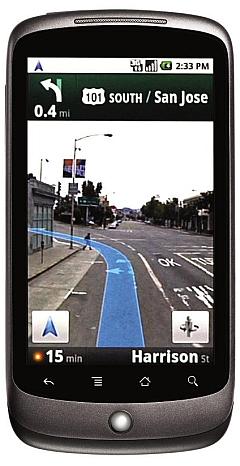
Google’s Nexus One launch this week was interesting for several reasons, the phone’s much faster processor, OLED screen and a form factor resembling the iPhone’s have led it to be dubbed an “iPhone Killer”. Much is also being made of the fact that Google is now selling phones directly to consumers. But that’s hardly revolutionary, Nokia and Sony Ericsson have long been more than willing to sell you a phone from their websites. And unlocked phones are available from Amazon and hundreds of other vendors as well independent phone shops in cities and towns around the world, including in the US.
What I find most interesting is that the Nexus One pricing structure gives consumers a financial incentive to buy the phone at full retail rather than signing up for a two year contract in return for a subsidized price. It’s pretty obvious if you do the math. There are two ways to buy the Nexus One and get service in the US:
- Sign a two year contract at $79.99/month (plus about $10/month in taxes and “fees”) for the “Even More 500 ” plan which includes 500 voice minutes, unlimited nights and weekends, unlimited T-Mobile to T-Mobile minutes and unlimited domestic Email, SMS, MMS, IM and data. In return for locking yourself into a two year contract, you get the Nexus One for a discounted price of $179. Total cost of ownership for two years is $179 + 24*(79.99 +$10) = $2,338.76.
- Buy the phone outright for $529 and use T-Mobile’s $59.99/month (plus about $7.50/month in taxes and fees) “Even More Plus 500” plan which includes exactly the same 500 voice minutes, unlimited nights and weekends, unlimited T-Mobile to T-Mobile minutes and unlimited domestic Email, SMS, MMS, IM and data as the more expensive contract plan. Total cost of ownership for two years is $529 + 24*($59.99 + $7.50) = $2,148.76.
Buying the phone outright saves you $190 over two years! This is actually as much T-Mobile’s doing as Google’s. Last October, the operator completely revamped their pricing structure to give consumers a $20/month price break if they bought a phone outright from either T-Mobile or a third party. I don’t know about the rest of the world, but in the US this is revolutionary. Operators in this country have never given discounts to users who supply their own handsets. Sprint, AT&T and Verizon still charge the same monthly price whether you accept a subsidized phone , pay full retail or bring you own phone. It’s not entirely clear to me how this change benefits T-Mobile, but as the smallest of the four national operators I guess they hope to gain market share by undercutting the competition in an innovative way.
The Nexus One is essentially being sold the same way that Dell, HP and Lenovo sell desktop and laptop computers, as a piece of hardware, a device independent of its network connection. If this model takes hold it will have huge implications on the mobile business. Operators will lose the ability to dictate if phones have WiFi, VOIP or tethering capabilities and whether 3rd party apps can access the GPS or file system. The true price and value of phones will be exposed forcing manufacturers to compete on features and true price rather than artificial and arbitrary subsidized pricing that makes an N900 appear to be five times more expensive than an iPhone.
I welcome the change. For too long mobile operators have controlled the handset market, favoring the handset makers most willing to lock and cripple phones to support the operator’s business model and penalizing users who choose to use a device not endorsed and sold by their operator. The PC pricing model will level the playing field forcing device vendors to compete on price, performance and features. Operators will have to compete on price, support and the reliability and speed of their networks rather than handset exclusivity. In the long run this will be good for consumers, operators and handset makers.
The situation in India is exactly the opposite. Here, one hardly buys a handset from the operator and also only few operators sell a very few models.
With a new player jumping into telecom market every 6 months on an average,customers are at good position.
It does look like a win-win situation. The net present value of the discounted cash flows is about the same to the purchaser (4% inflation, it is $112.10 less expensive in current dollars to buy the unlocked phone).
And, T-Mobile gets a larger sum of cash with the unlocked phone which probably have a favorable impact on their financials and their ability to invest.
I buy all my phones unlocked from T-Mobile even the ones that I use on AT&T. Still a great solution.
I wonder why my international roaming options will be in France, Germany, the UK and Canada …